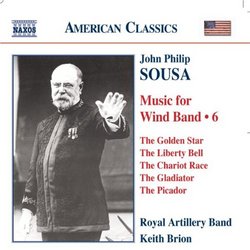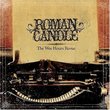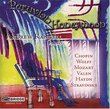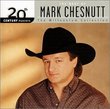| All Artists: John Philip Sousa, Keith Brion, Royal Artillery Band Title: John Philip Sousa: Music for Wind Band, Vol. 6 Members Wishing: 0 Total Copies: 0 Label: Naxos American Original Release Date: 1/1/2007 Re-Release Date: 2/27/2007 Genres: Jazz, Special Interest, Classical Styles: Swing Jazz, Marches, Opera & Classical Vocal, Chamber Music, Historical Periods, Classical (c.1770-1830) Number of Discs: 1 SwapaCD Credits: 1 UPC: 636943913222 |
Search - John Philip Sousa, Keith Brion, Royal Artillery Band :: John Philip Sousa: Music for Wind Band, Vol. 6
 | John Philip Sousa, Keith Brion, Royal Artillery Band John Philip Sousa: Music for Wind Band, Vol. 6 Genres: Jazz, Special Interest, Classical
ROYAL ARTILLERY BAND |
Larger Image |
CD DetailsSynopsis
Product Description ROYAL ARTILLERY BAND Similar CDs
|
CD ReviewsWill the real John Philip Sousa please stand up? P. L. Browning | Turlock, CA USA | 12/19/2009 (5 out of 5 stars) "Played 'Oh so well', it is more than a delight to hear the oldest British band, here under the leadership of American Conductor (and Sousa specialist) Keith Brion, play Sousa. But of perhaps even greater interest is the excellent playlist of Sousa tunes reaching well outside "The March King" box. One could argue that "Three Quotaions (Suite for Band)" should take its place next to Holst's Suites. And there is much more of great worth on this fine recording. Get it, and see if you agree." Sousa well played John H. Havener, Jr. | Billings, MT | 05/07/2009 (5 out of 5 stars) "The Royal Artillery Band renders the music of Sousa as well as any band out there. These recordings are accurate in tempo, excellent in interpretation and superbly played by the band. I ordered just one of the discs, initially, but will soon order the rest. Great collection for the Sousa enthusiast or serious student of American music." Another Fine Sousa CD from Keith Brion and the Royal Artille J Scott Morrison | Middlebury VT, USA | 04/07/2007 (5 out of 5 stars) "This sixth volume in the ongoing series of wind band music by John Philip Sousa, conducted by Sousa expert Keith Brion, is excellent not only because of the fine playing of Britain's Royal Artillery Band, but because it contains some of Sousa's least known, but most worthy, music. For instance, one never hears the fine 1919 'Golden Star', a funeral march dedicated to Mrs Theodore Roosevelt (and also, of course, to the many young men who died in the Great War). It incorporates 'Taps' in the musical material in moving fashion.
The contents of the CD is really a miscellany, with music from one of Sousa's operettas (the sextet from 'The Bride Elect', 1897), a march for the graduation of cadets from the Pennsylvania Military Academy ('Dauntless Battalion', 1922), and a suite for band called 'Three Quotations' (1895), containing a satirical march set to the couplet 'The King of France with twenty thousand men marched up the hill and then marched down again', and whose final movement, 'In Darkest Africa' incorporates jazzy syncopations and melodic contours presumably typical of native African music. 'The Federal', 1910, was written for the band's tour of Australasia and one hears the measured Elgarian tread of British marches. Easily the most familiar work played here is 'The Liberty Bell', widely known and frequently played long before its use as the theme song for 'Monty Python's Flying Circus.' One actually wishes this piece wasn't so identified with that comic series because it is one of Sousa's best marches but it will be associated, for the foreseeable future at least, with that comedy when in fact it is a stirring military march. The performance here is excellent; and one can actually hear the 'bell' as called for in Sousa's score. One of Sousa's most elegant works is his 1886 'La Reine de la Mer', a set of waltzes which puts woodwinds in the foreground and actually sounds more French than American, something Sousa clearly intended. A world away is Sousa's exciting 'The Chariot Race', inspired by that famous scene in Lew Wallace's novel of Roman times, 'Quo Vadis'. Finally we have 'The Gladiator' (1886), 'The Picador' (1889), and 'New Mexico' (1928), the latter two mixing in Spanish rhythms and melodies. This is a fine addition to the series and one I would recommend without hesitation. Scott Morrison" |

 Track Listings (15) - Disc #1
Track Listings (15) - Disc #1



